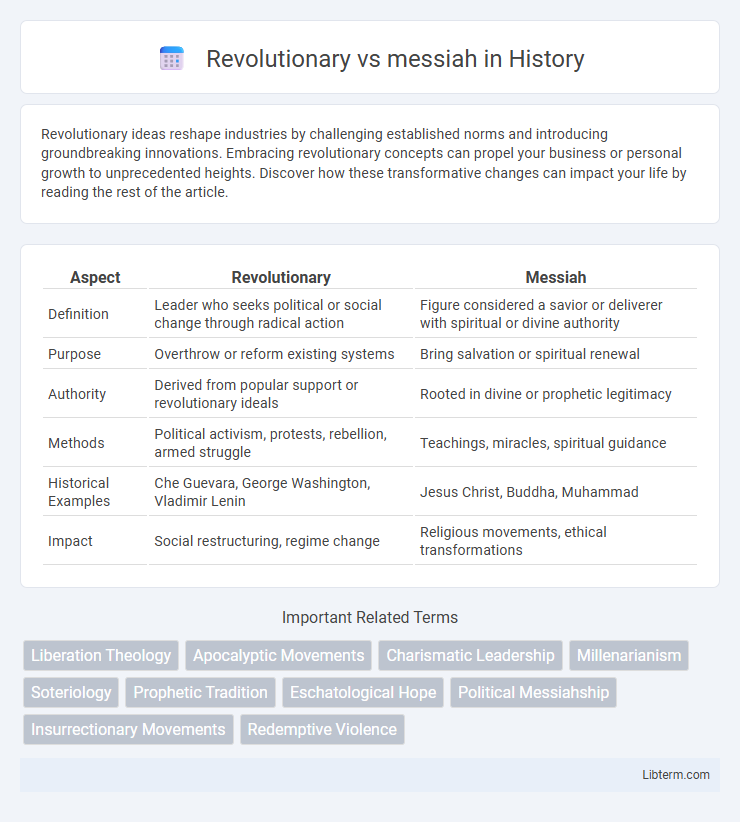Revolutionary ideas reshape industries by challenging established norms and introducing groundbreaking innovations. Embracing revolutionary concepts can propel your business or personal growth to unprecedented heights. Discover how these transformative changes can impact your life by reading the rest of the article.
Table of Comparison
| Aspect | Revolutionary | Messiah |
|---|---|---|
| Definition | Leader who seeks political or social change through radical action | Figure considered a savior or deliverer with spiritual or divine authority |
| Purpose | Overthrow or reform existing systems | Bring salvation or spiritual renewal |
| Authority | Derived from popular support or revolutionary ideals | Rooted in divine or prophetic legitimacy |
| Methods | Political activism, protests, rebellion, armed struggle | Teachings, miracles, spiritual guidance |
| Historical Examples | Che Guevara, George Washington, Vladimir Lenin | Jesus Christ, Buddha, Muhammad |
| Impact | Social restructuring, regime change | Religious movements, ethical transformations |
Defining Revolutionary and Messiah
A revolutionary is an individual who seeks to enact fundamental political or social change, often through activism, rebellion, or reform, challenging existing systems and structures. A messiah is a prophesied or anointed figure believed to bring salvation, deliverance, or ultimate transformation, often with spiritual or religious connotations. While revolutionaries focus on tangible societal shifts, messiahs are associated with divine intervention and moral or eschatological fulfillment.
Historical Contexts of Revolutionaries and Messiahs
Revolutionaries often emerge during periods of political upheaval, challenging existing power structures to enact social, economic, or political change, as seen in figures like Che Guevara during the Cuban Revolution. Messiahs typically arise in religious or spiritual contexts, embodying the hope for salvation or divine intervention, exemplified by figures such as Jesus Christ in early 1st-century Judea under Roman rule. The historical contexts shape revolutionaries as agents of temporal transformation, whereas messiahs are framed as harbingers of spiritual redemption and eternal deliverance.
Motivations: Social Change vs Spiritual Salvation
Revolutionaries drive social change by challenging existing political and economic systems to achieve justice and equality within society, motivated by tangible improvements in governance, rights, and living conditions. Messiahs inspire spiritual salvation, focusing on transforming individuals' inner lives and offering hope for eternal redemption or divine intervention. The core motivation of revolutionaries centers on external societal structures, while messiahs emphasize internal spiritual awakening and moral renewal.
Key Characteristics and Traits
A revolutionary embodies radical change through disruptive actions aimed at overthrowing existing systems, characterized by innovation, defiance, and often collective mobilization. A messiah symbolizes salvation and hope, marked by visionary leadership, moral authority, and the ability to inspire unwavering faith among followers. While revolutionaries rely on activism and confrontation, messiahs emphasize spiritual guidance and transformational influence.
Methods: Action vs Inspiration
Revolutionaries drive change through direct action, employing strategies like protests, uprisings, and policy reforms to dismantle existing systems. Messiahs inspire transformation by embodying vision and moral authority, galvanizing followers with rhetoric, teachings, and symbolic acts. While revolutionaries focus on tangible disruption, messiahs prioritize spiritual motivation and long-term cultural shifts.
Societal Impact and Legacy
Revolutionaries catalyze societal transformation through radical change, disrupting existing structures and inspiring mass movements that redefine political and social landscapes. Messiahs often unify communities by offering hope and moral guidance, shaping cultural and spiritual legacies that endure beyond their lifetimes. The societal impact of revolutionaries tends to be immediate and systemic, while messiahs influence long-term values and collective identity.
Cult of Personality: Leader vs Savior
The cult of personality surrounding a revolutionary often elevates the leader as a transformative figure who embodies change and political power, whereas the messiah is venerated as a divine savior with spiritual authority and prophetic significance. Revolutionary leaders gain influence through ideology and mobilization, while messiahs command devotion based on faith and salvation narratives. This distinction shapes how followers perceive legitimacy, authority, and the nature of the movement itself.
Reception by Followers and Opponents
Revolutionaries often gain support through calls for systemic change, attracting followers who seek political or social reform, while opponents view them as threats to established order, sometimes responding with repression or resistance. Messiahs typically inspire devotion by claiming spiritual or divine authority, leading followers to embrace transformational beliefs and practices, whereas critics may reject their legitimacy or label them as heretical. The reception of both figures reflects contrasting dynamics of legitimacy, authority, and the scope of influence within their respective communities.
Revolutionary and Messianic Figures in History
Revolutionary figures like Che Guevara and Thomas Jefferson catalyzed profound societal transformations by challenging existing political structures and advocating for radical change. Messianic figures such as Martin Luther King Jr. and Joan of Arc inspired followers through a divine or prophetic mission, often emphasizing moral and spiritual renewal alongside social reform. Both types of leaders profoundly influence historical trajectories, shaping collective identities and ideologies across different cultures and epochs.
Modern Interpretations: Blurring the Lines
Modern interpretations increasingly blur the lines between revolutionary and messiah, portraying both figures as agents of profound systemic change who challenge entrenched power structures. Cultural narratives emphasize their shared roles in inspiring collective movements, often attributing messianic qualities to revolutionary leaders through symbolism and rhetoric. This convergence reflects contemporary society's desire for transformative leadership that combines political activism with visionary guidance.
Revolutionary Infographic

 libterm.com
libterm.com